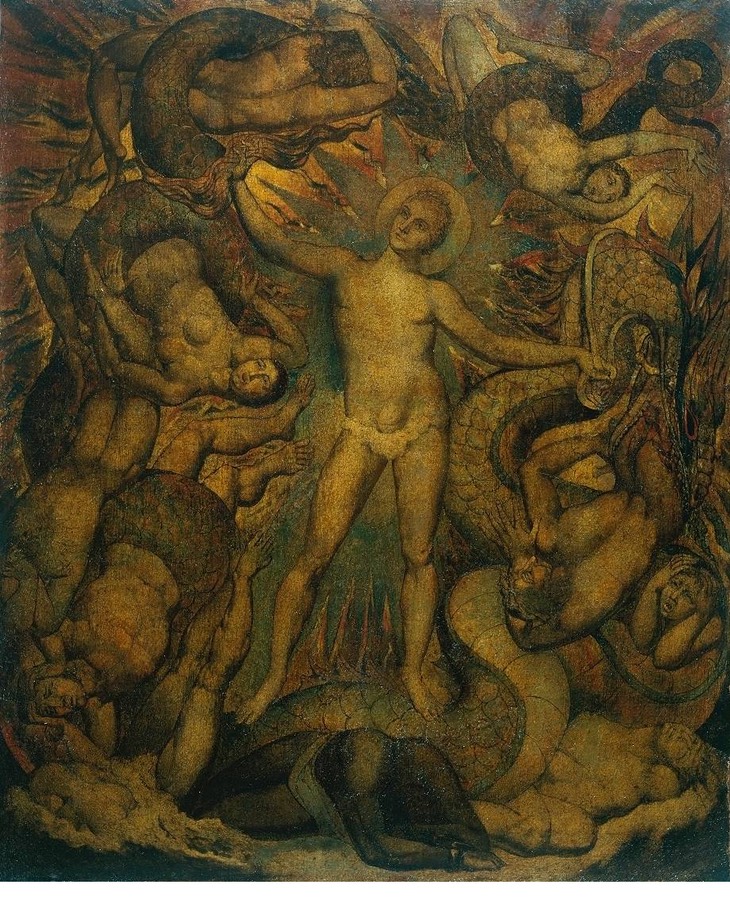Back to article index
Previous
ORDER AND CHAOS, LAND AND SEA

William Blake: The spirit of Nelson guiding Leviathan
The right of the sovereign to decide the exception implies the existence of a norm. Where there is no norm there can be no exception. This connects with the theme of an essay by Schmitt published in the 'Empire' section of the website - the contradiction between the land, subject to ordered division, and the sea, which is without limits.
According to Schmitt, it is no accident that England which, in the sixteenth century, detached itself from Europe and adopted a whole hearted commitment to the sea, was also, in the eighteenth century the pioneer country of the industrial revolution. The sea has no limits and the advance of technology has no limits. He draws a sharp contrast between a ship and a house:
'The island ceased to be a separately located fragment of the Land and turned into a Ship anchored near the continent … The ship is the basis of the marine existence of people, just as the House is the basis of their land existence. Ship and House are not antitheses in the sense of static polarity; they represent different responses to different challenges of history. Both the Ship and the House are created with the help of technical means, but their main difference is that the Ship is an absolutely artificial, technical vehicle based on the total domination of man over nature. The sea is a kind of natural environment, sharply different from the land. The sea is more aloof and hostile. According to the biblical story, man received his habitat precisely through the separation of the Earth from the Sea. The sea remained fraught with danger and evil. Here we refer readers to the commentaries on the first chapter of the Book of Genesis. in the third volume of "Church Dogmatics" by Karl Barth. Let us only emphasize that in order to overcome the ancient religious horror of the Sea, mankind had to make a significant effort. The technical effort made to overcome this is essentially different from any other technical effort. A man who dares to embark on a sea voyage - the word "pirate" originally meant one who is capable of such a risk - should, according to the poet, [have] "triple armor on his chest" (aes triplex circa pectus). Man's overcoming of the inertial resistance of nature, which is the essence of cultural or civilizing activity, differs sharply in the case of shipbuilding and the development of the Sea and in the case of breeding livestock and building dwellings on the Land …
'The terrestrial existence, of which the House is the center, has a completely different relation to technology than the marine existence, of which the Ship is the center. The absolutization of technical progress, the identification of any progress exclusively with technical progress, in short, what is meant by the expression "liberated technical impulse", "liberated technology" - all this could originate, grow and develop only on the basis of marine existence, in the climate of marine existence … the island of England accepted the challenge of the opening of the world ocean and brought to its logical conclusion the transition to a purely marine existence, it gave a historical answer to the question posed by the era of great geographical discoveries. At the same time, this was both a prerequisite for the industrial revolution and the beginning of an era whose problems we all experience today.'
This gives him a framework for understanding the October revolution:
'Marxism was adopted by the elite of Russian professional revolutionaries, who managed to make a revolution in the Russian Empire in 1917 and transfer the double superstructure to the conditions of their agrarian country. In all this, it was by no means about the practical implementation of pure teaching and about the logical implementation of the objective laws of historical development. It was about the fact that an industrially backward agrarian country felt the need to arm itself with modern industrial technology, since otherwise it would be provided with the role of prey for other more developed industrialized large powers. Thus, Marxism turned from an ideological superstructure of the second stage of the industrial revolution into a practical tool for overcoming the industrial and technical insecurity of a vast country, as well as for removing the old elite, which clearly could not cope with the historical task'
A footnote, almost certainly written by Alexander Dugin, expresses approval:
'One of the most original and correct explanations of the October Revolution, complementing its interpretation, typical of the National Bolsheviks (both German and Russian) and Eurasians, according to which it was a purely national and geopolitical transformation aimed at strengthening the positions of the Land and organization of a New Order in Eurasia, more effective and consistent than the New Order created in Central Europe by Mussolini and Hitler.'
Dugin has written extensively elsewhere about the 'National Bolsheviks' and 'Eurasianists' who emerged particularly in the 1920s among the Russian emigration arguing that the great achievement of the Bolsheviks had been to save the Russian state (and, ultimately, empire) from the disintegration that threatened it after the February revolution. Mention has been made earlier of the French counter-revolutionary theorist Joseph de Maistre (who, as it happens, lived in Russia for fourteen years, from 1803 to 1817. One of his most important books is called Les Soirées de Saint-Pétersbourg.). In his Considérations sur la France, published in 1797, he argues that the Jacobins had saved the French state from the disintegration that threatened it after the French revolution of 1789 and the disastrous policies adopted by the Girondins. It could only be done by terror and in de Maistre's view it was a grace of God that the terror was executed by the revolutionaries, otherwise it would have had to be done by a restored monarchy, much less well-adapted psychologically for the job.